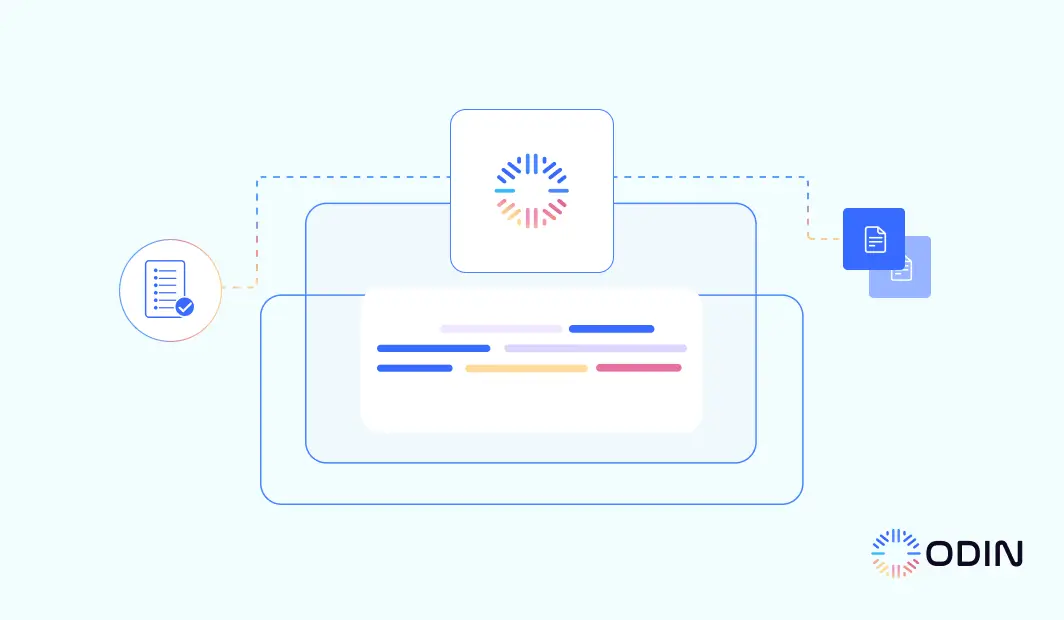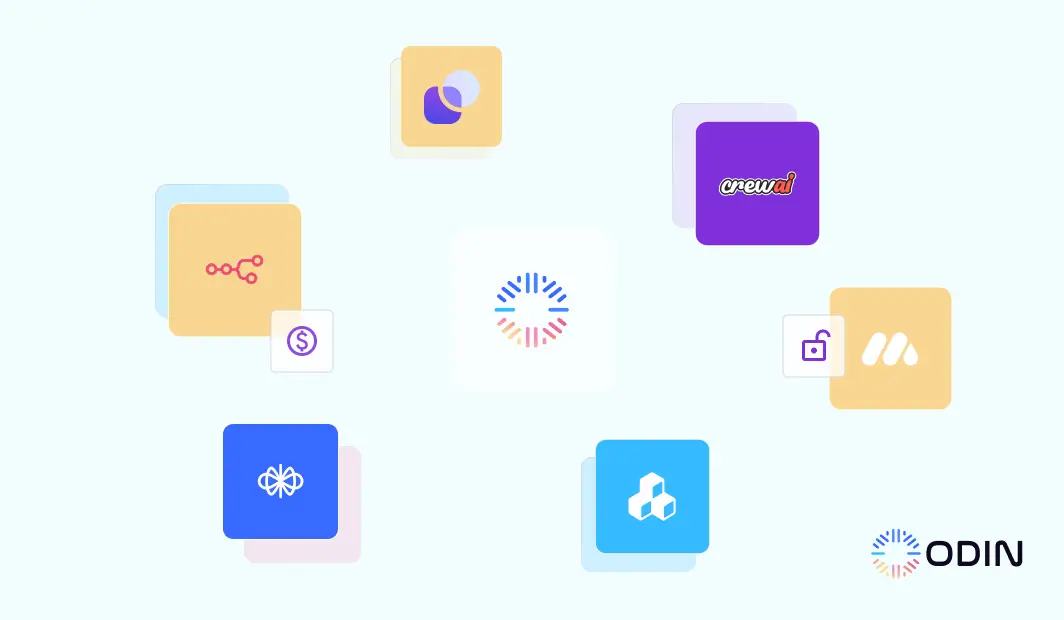Enterprises today face significant challenges in extracting meaningful insights from the vast amounts of enterprise data stored in formats like PDFs, PPTs, and JSON files. These diverse enterprise data storage formats often create silos, making it difficult to fully utilize the data for strategic decision-making. Managing different types of data, including essential business data, is crucial for creating standardized master files that define necessary fields for various business processes.
The emergence of Generative AI is set to transform how enterprises manage and leverage their enterprise data. Unlike traditional tools, Generative AI can interpret and analyze complex enterprise data to provide deeper, more actionable insights. This capability is crucial for enterprises looking to stay ahead in a data-driven world.
Odin AI addresses these challenges by integrating Generative AI with your enterprise data, ensuring that it’s not just stored, but actively used to drive decisions. Whether your data is in enterprise data centers or spread across various formats, Odin AI makes it possible to unlock its full potential.
This blog aims to show how enterprises can effectively combine Generative AI with their enterprise data to extract valuable insights, turning data challenges into opportunities for growth and innovation.
Make smarter decisions—give Odin AI a go!
Recommended Reading
What Is a Knowledge Base? Complete Beginner’s Guide 2024
The Data Dilemma in Enterprises
The Variety of Data Formats
Over the years, enterprises have amassed vast amounts of enterprise data in a multitude of formats, creating both opportunities and challenges in enterprise data management. Understanding data lineage is crucial in this context, as it documents and directs the flow of data throughout its life cycle, helping organizations identify data dependencies, enhance data accessibility, and mitigate risks such as data breaches and legal complications.
Common File Formats
PDF
Widely used for reports, documentation, and presentations, PDFs are a staple in enterprise data storage but often present challenges in data extraction and analysis.MP4
As video content becomes increasingly important, enterprises accumulate large amounts of MP4 files, especially in training, marketing, and communication.DOCX
Essential for word processing, DOCX files are prevalent in enterprise data but require effective enterprise data integration to be fully leveraged.HTML
Web-based documents and resources often stored in HTML format add another layer of complexity to enterprise data management.JSON
Frequently used for data interchange, JSON files are critical in modern applications but need robust enterprise data platforms to manage effectively.XML
Similar to JSON, XML files are used to store and transport data, making them integral to enterprise data strategies.TXT
Simple text files, while basic, are often used in enterprise data backup solutions and require proper management to maintain data quality.CSV
Common in data analysis, CSV files are vital for handling structured data but necessitate precise enterprise data governance to ensure data accuracy.
Get more from your data with Odin AI
Recommended Reading
“Create Custom Chatbots: A No Code Solution by Odin AI”
The Types of Data and Documentation in Enterprise Data Strategy
Financial Reports
Detailed enterprise data such as quarterly earnings, annual reports, and financial statements stored in PDF and DOCX formats.Product Documentation
Technical manuals, user guides, and specifications often stored in HTML, TXT, and PDF formats, essential for enterprise data management and support services.Research Papers
In-depth studies and white papers in PDF and DOCX formats, contributing to the enterprise data catalog and supporting enterprise data science efforts.Case Studies
Documented examples of past projects and customer success stories, typically stored in PDF and PPT formats, used for strategic planning and marketing.Customer Data
Enterprise customer data platforms store this information in JSON, CSV, and XML formats, crucial for understanding customer behavior and improving services.Training Materials
Videos, presentations, and guides stored in MP4, PPT, and DOCX formats, used for employee development and maintaining enterprise data security protocols.- Compliance Documents
Legal and regulatory documentation stored in PDF and DOCX formats, vital for enterprise data governance and ensuring adherence to industry standards.
Turn your data into gold with Odin AI.
Recommended Reading
Odin’s AI Powered Knowledge Base: Revolutionizing Information Management
Challenges in Extracting Useful Information from Diverse Data Formats
When dealing with enterprise data in various formats, enterprises face significant challenges that go beyond simple data extraction. Master data management is crucial for creating a unified view of critical business data through a master file, which outlines essential fields needed for various processes, ensuring that organizations can manage their data effectively and maintain consistency across different systems. Understanding the complexity of working with large language models (LLMs) and the intricacies of enterprise data management is crucial for overcoming these obstacles.
Data Complexity
The type and quality of enterprise data significantly affect the complexity of processing. Formats like PDFs with images or MP4 files with multiple speakers are far more challenging to handle compared to structured HTML or DOCX files.Data Organization
Poorly organized or unstructured enterprise data increases the difficulty of extraction and complicates enterprise data management and data integration efforts.Data Location and Access
The location of enterprise data—whether in local systems, cloud storage, or different enterprise data centers—adds layers of complexity. The method of updating data (live vs. static) further impacts accuracy and timeliness.Data Volume and Formatting
Large volumes of enterprise data require more resources and custom solutions. Well-formatted data like HTML is easier to process than unstructured formats like PDFs.Metadata Importance
Quality metadata is crucial for accurate LLM responses, making it a key aspect of enterprise data governance.Setting Expectations
Enterprises must set realistic expectations, as LLMs may not achieve 100% accuracy with complex datasets. Clear communication is vital for a successful enterprise data strategy.MVP Approach
Tackling complex projects with a Minimum Viable Product (MVP) approach allows enterprises to demonstrate value early and iteratively build on success, aiding in effective enterprise data management.Automation and AI Synergy
Combining automation with AI enhances efficiency in managing large-scale enterprise data, ensuring accurate and timely insights.
Addressing these challenges enables enterprises to leverage Generative AI effectively, unlocking valuable insights from diverse data formats.
Recommended Reading
How AI-Powered Knowledge Base Helps Optimize Customer Support Processes
Common Enterprise Questions
Questions Enterprises Need Answers To
Enterprises across sectors such as finance, e-commerce, and retail regularly seek to derive actionable insights from their enterprise data. These insights are crucial for making informed decisions, improving products, and enhancing customer satisfaction. Here are some typical questions enterprises want to answer using their enterprise data:
Identifying Patterns in the Data
- “What are the most frequently asked questions by our consumers about our services?”
- “How do customer sentiments about our product quality vary across different regions?”
- “Which product features are mentioned most often in customer feedback?”
Enterprises aim to uncover patterns in enterprise data to understand customer behavior and preferences, which are crucial for enhancing product offerings and customer satisfaction.
Summarizing the Data
- “What are the key insights on how consumers use our new product line?”
- “Can you provide a summary of the dissatisfaction points regarding our customer service?”
- “What are the main trends in customer feedback over the past year?”
Summarizing enterprise data helps organizations get a quick overview of customer feedback and operational performance, enabling them to address issues more effectively.
Extracting Insights
- “What are the unmet needs in the e-commerce sector identified over the last year?”
- “Which features do customers consistently request in our product development feedback?”
- “What insights can we gather about customer expectations for delivery times?”
Extracting insights from enterprise data allows companies to identify gaps in the market and develop products that better meet customer needs.
Providing Recommendations Based on Data
- “What website improvements could increase customer satisfaction?”
- “How can we enhance our product offerings based on recent consumer behavior data?”
- “What strategies should we adopt to improve our customer loyalty program?”
Enterprise data analytics enables organizations to generate actionable recommendations that drive business growth and enhance customer experiences.
Mathematical and Statistical Analysis
- “How many times have customers mentioned dissatisfaction with our return policy?”
- “What is the correlation between customer satisfaction and product price?”
- “How did changes in marketing strategy impact sales growth in Q2-20xx?”
Performing mathematical and statistical tasks on enterprise data helps organizations quantify trends and measure the impact of various factors on their business outcomes.
Showcasing Relevant Research and Consumer Feedback
- “What research studies include insights about our product’s market performance?”
- “Can you provide feedback that discusses consumer expectations for our upcoming product launch?”
- “Which customer reviews highlight key areas of improvement for our services?”
Accessing specific insights from enterprise data enables teams to make informed decisions during product development and marketing campaigns.
Ideation Based on Insights
- “What should we change in our product design to increase customer satisfaction based on launch feedback?”
- “How can we innovate our services based on recent customer insights?”
- “What new product features could we develop to meet emerging customer needs?”
Ideating on enterprise data insights helps companies refine their products and services, ensuring they meet evolving customer expectations.
These questions illustrate the types of inquiries enterprises typically pose to extract value from their enterprise data. By addressing these queries, companies can leverage enterprise data analytics to drive innovation, optimize customer experiences, and achieve strategic goals.
Recommended Reading
How to Extract Text from PDF Files in Minutes
Odin AI’s Multilevel AI Agent
How Odin AI Solves These Challenges
Odin AI is designed to address the complexities of enterprise data management by deploying a sophisticated Multilevel AI Agent that processes and refines queries to deliver precise, actionable insights. This AI agent is particularly effective for enterprises dealing with large volumes of enterprise data, such as economic reports, financial documentation, and customer feedback.
The Multilevel AI Agent operates by breaking down complex queries into manageable components, allowing for a more nuanced analysis of enterprise data. Here’s how it works:
Query Complexity Levels
Easy
For straightforward queries, the agent sends a single query to the Large Language Model (LLM) and retrieves the results. This level is ideal for basic information retrieval from enterprise data.
Medium
For moderately complex queries, the agent refines the initial query by considering the context provided in the enterprise data platform. It then runs multiple queries, ensuring a more thorough analysis and better alignment with the user’s needs.
Difficult
For highly complex or nuanced queries, the agent employs an advanced approach by sending up to 10 refined queries to the LLM. This method ensures that even the most intricate aspects of enterprise data are thoroughly analyzed, resulting in highly accurate and actionable insights.
The Multilevel AI Agent is equipped to handle a wide range of queries, from finding patterns in enterprise data to extracting in-depth insights and providing strategic recommendations. By adjusting its approach based on the complexity of the user’s queries, Odin AI ensures that enterprises can extract maximum value from their enterprise data.
This dynamic query processing capability is what sets Odin AI apart in the field of enterprise data management. Whether you’re dealing with simple queries or complex, multi-faceted questions, Odin AI‘s Multilevel AI Agent delivers the precise information needed to drive informed decision-making and enhance enterprise data strategies.
Tap into your data’s power—Contact Odin AI
Recommended Reading
Get Ahead in Marketing: Task Automation and Content Generation with Odin AI Actions
Advanced Insights Beyond Basic Queries
Odin AI stands out by going beyond the capabilities of basic Large Language Models (LLMs), offering advanced processing that modifies user queries based on the specific content within the enterprise data knowledge base. This approach allows Odin AI to deliver more nuanced and actionable insights, tailored to the unique needs of each enterprise. A generative AI model can significantly enhance these capabilities by producing outputs such as text, images, and complex simulations, which can be applied across various industries.
Query Modification and Contextual Understanding
- Unlike traditional LLMs that provide generic responses, Odin AI refines and adjusts queries by analyzing the context within the enterprise data platform. By considering the historical and current data stored in enterprise data centers, Odin AI ensures that the information retrieved is not only accurate but also relevant to the specific needs of the business. Generative AI models further enhance this by producing human-like outputs and addressing potential biases and inaccuracies.
- Unlike traditional LLMs that provide generic responses, Odin AI refines and adjusts queries by analyzing the context within the enterprise data platform. By considering the historical and current data stored in enterprise data centers, Odin AI ensures that the information retrieved is not only accurate but also relevant to the specific needs of the business. Generative AI models further enhance this by producing human-like outputs and addressing potential biases and inaccuracies.
Examples of Advanced Insights
Macroeconomic Trends
For a financial services enterprise, Odin AI can analyze years of economic reports stored in PDFs and JSON files, identifying key trends and predicting future market movements. This enables decision-makers to make informed, strategic decisions that are grounded in robust enterprise data analysis.Customer Behavior Analysis
In the e-commerce sector, Odin AI can sift through enterprise data such as customer feedback and transaction records to uncover patterns in consumer behavior. By modifying queries to reflect specific business objectives, Odin AI delivers insights that help optimize marketing strategies and improve customer satisfaction.Operational Efficiency
For retail enterprises, Odin AI can analyze enterprise data from various operational reports, identifying inefficiencies and suggesting improvements. The agent’s ability to modify queries ensures that insights are directly aligned with the company’s operational goals, leading to enhanced productivity and reduced costs.
Why wait? Contact Odin AI today!
Recommended Reading
IT Support Automation with Internal Helpdesk Agent
Enterprise Queries Solved By Odin AI
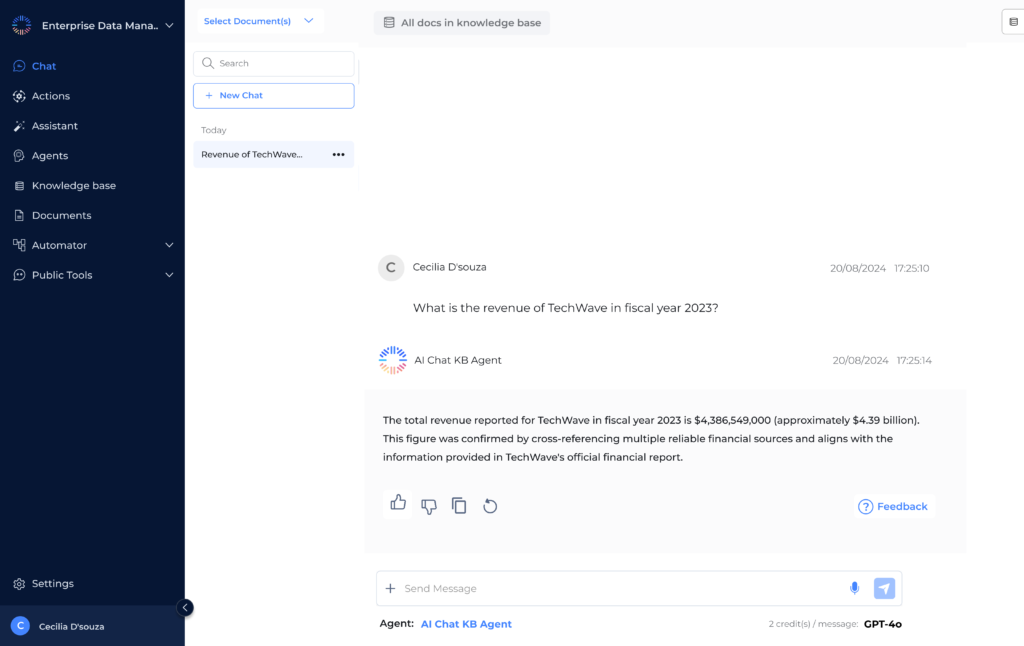
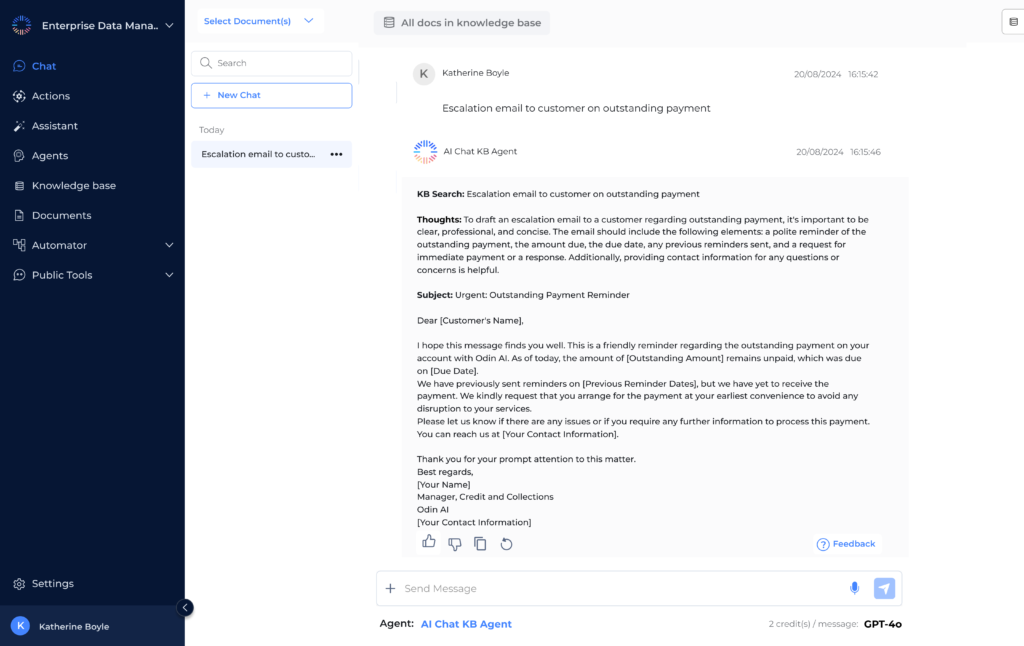
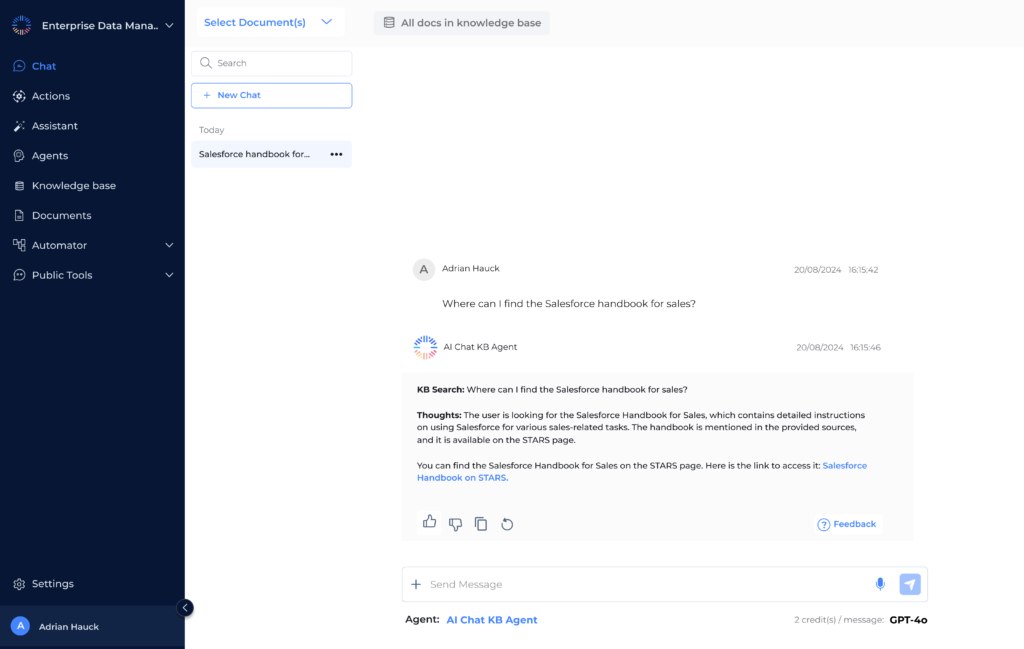
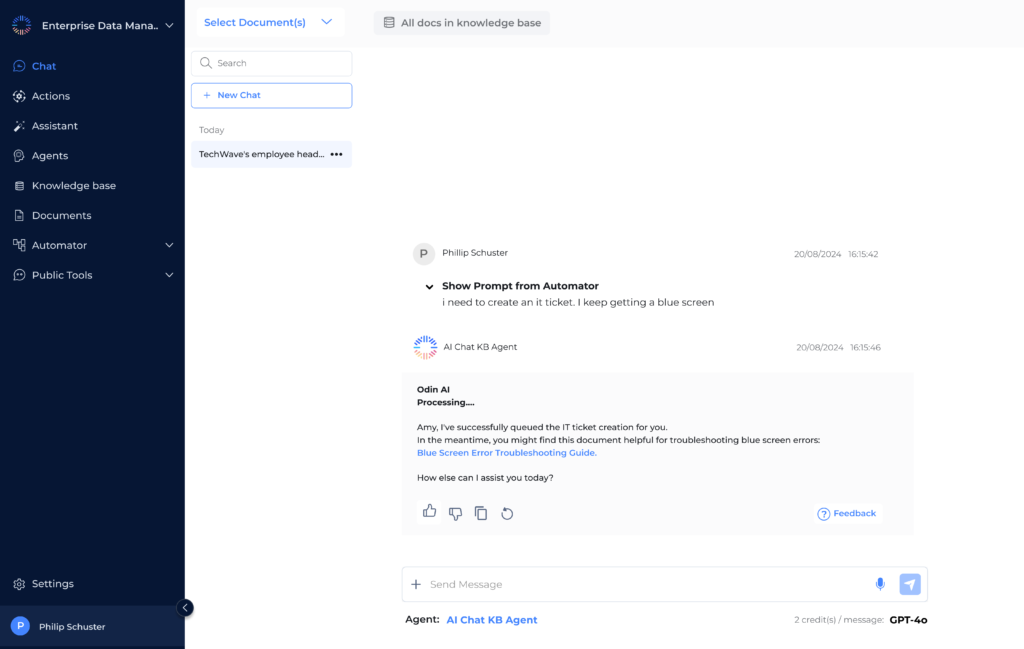
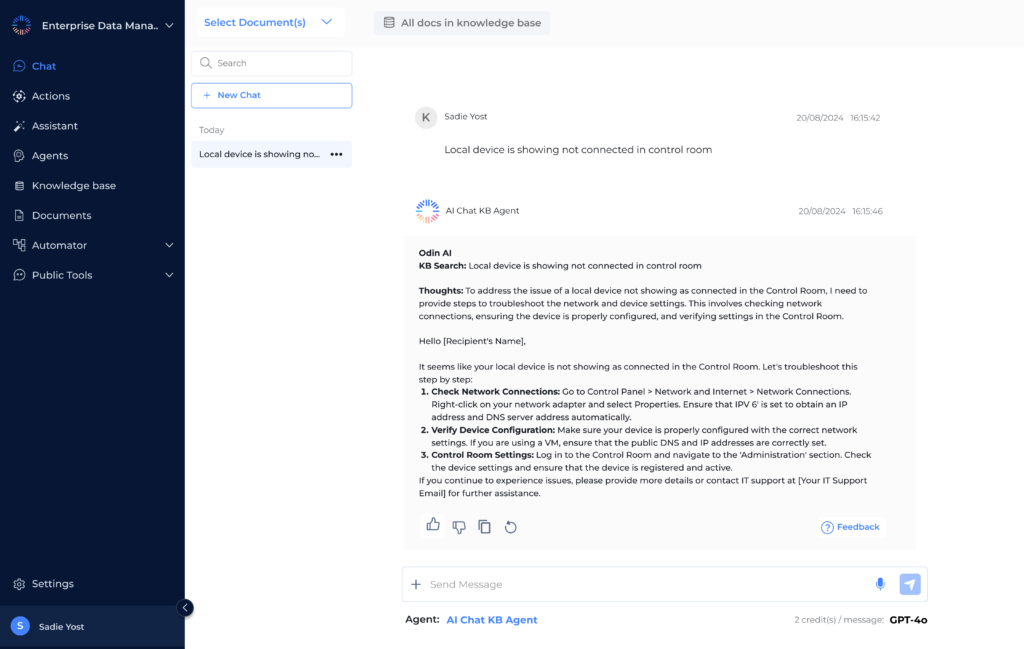
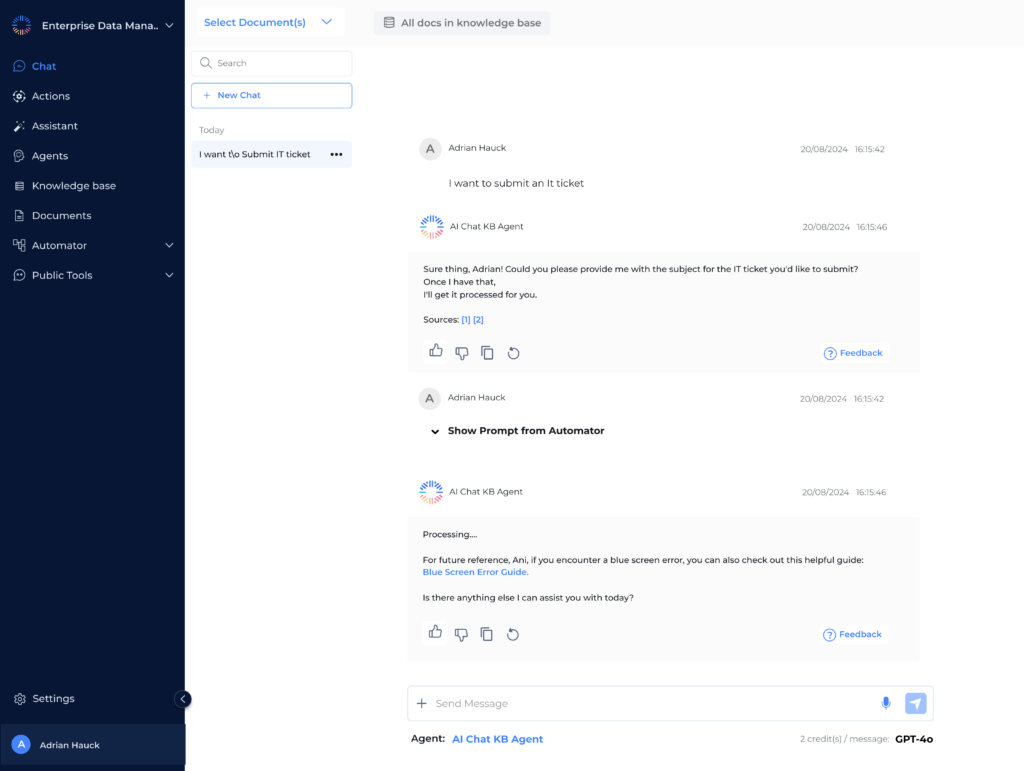
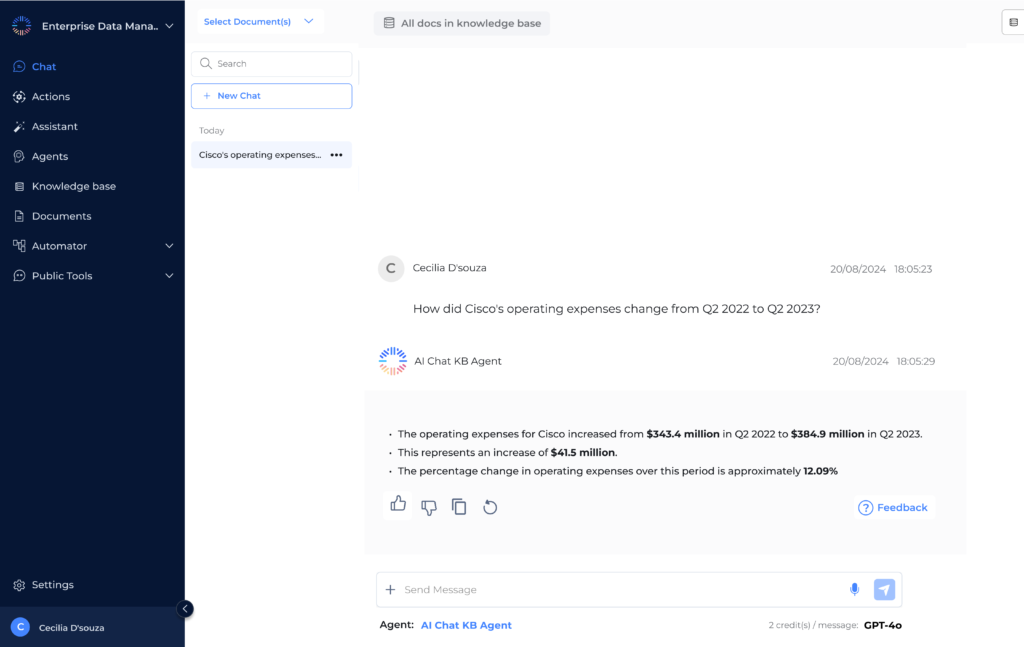
The Transformative Impact of Odin AI on Decision-Making
By going beyond basic query processing, Odin AI provides decision-makers with high-quality data and insights that are not only accurate but also deeply relevant to their strategic objectives. This advanced approach to enterprise data management enables companies to unlock the full potential of their enterprise data, driving growth and innovation in ways that traditional LLMs cannot achieve.
Enterprises face the challenge of making sense of vast amounts of enterprise data stored in various formats. The decisions that shape a company’s future depend on the ability to extract actionable insights from this data. Odin AI transforms decision-making by elevating enterprise data to provide high-quality insights that drive more informed and strategic choices.
With Odin AI, forecasting becomes more accurate, allowing businesses to anticipate market shifts and customer needs with precision. Strategic planning is sharper and more aligned with company goals, leading to better resource allocation and a stronger competitive edge.
Beyond the data and strategies, Odin AI instills confidence in every decision made, ensuring each choice is backed by advanced enterprise data analytics. This means you’re not just making decisions—you’re securing the future of your enterprise with the most reliable insights available. In today’s fast-paced world, that confidence is invaluable.
Have more questions?
Contact our sales team to learn more about how Odin AI can benefit your business.
FAQs
Generative AI refers to a type of artificial intelligence that can generate new content, such as text, images, or data, based on the patterns it has learned from existing data. It’s particularly useful in enterprises for creating insights from large datasets.
Generative AI enhances enterprise data management by processing and analyzing vast amounts of data, enabling more accurate and actionable insights. It helps in improving decision-making, strategic planning, and forecasting within an organization.
Generative AI can work with various types of enterprise data, including PDFs, PPTs, JSON files, XML, DOCX, and more. It’s capable of extracting insights from diverse data formats to help businesses make informed decisions.
Odin AI leverages Generative AI to refine and modify user queries based on the content within the enterprise’s knowledge base. This approach allows for deeper analysis and provides more precise and relevant insights, significantly improving decision-making processes.
Enterprises often struggle with data silos, inconsistent data quality, complex data extraction processes, and the integration of diverse data formats. Odin AI addresses these challenges by providing advanced tools for enterprise data integration and analysis.
Yes, Odin AI is designed to handle complex queries by using a Multilevel AI Agent that breaks down and refines queries, ensuring accurate and detailed responses based on the specific needs of the enterprise.
Generative AI enhances forecasting by analyzing historical data trends and predicting future outcomes with greater accuracy. It also aids in strategic planning by providing insights that align with the company’s goals and objectives.
While basic Large Language Models (LLMs) provide general responses, Odin AI goes beyond by modifying queries to reflect the specific context within an enterprise’s data, delivering more nuanced and actionable insights.
Enterprises can start by integrating Generative AI tools like Odin AI into their existing enterprise data platforms. This allows them to process and analyze their data more effectively, leading to better insights and decision-making.
Generative AI is crucial for the future of enterprise data management as it enables businesses to fully leverage their data, transforming it into a strategic asset that drives growth, innovation, and competitive advantage.
